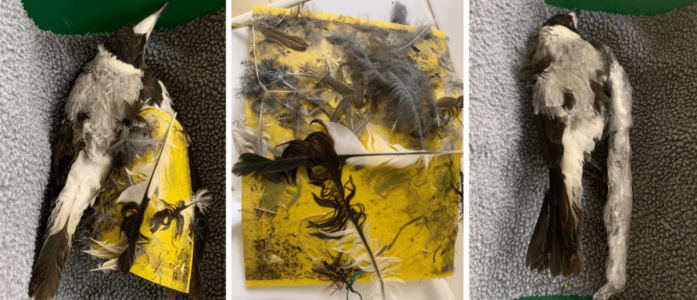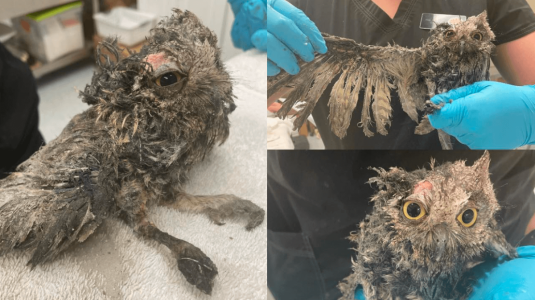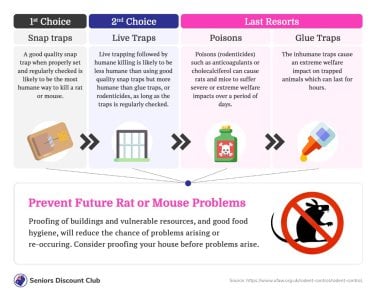Victory for animal lovers: Bunnings to ‘phase out’ certain glue trap products
- Replies 25
Warning: This story contains images and content that may be distressing and include graphic imagery. Reader discretion is advised.
Last year, we reported on the issue of glue traps, as animal rights advocates demanded an end to the sale of these cruel devices. The pressure was mounting on major retailers like Bunnings to remove them from their shelves.
Glue traps are designed to catch rodents, but unfortunately, they are also responsible for trapping a wide range of animals, including birds, lizards, and even snakes. These animals suffer horribly, often remaining stuck in the traps for days, unable to move or escape.
Ultimately, they die from dehydration and starvation.
A petition has gained such widespread support that emphasises the brutality of glue traps, stating that they cause 'horrific pain and suffering to any animal that comes in contact with them'.
With over 90,000 signatures on a petition calling for their withdrawal, it's clear that people are passionate about protecting innocent animals from the inhumane suffering caused by these traps.

The use of glue traps continues to wreak havoc on innocent animals, with recent incidents involving bats highlighting the ongoing cruelty associated with these devices. A WIRES volunteer has revealed that she was involved in two bat rescues in just two weeks, with both animals being caught in traps intended for fly control in gardens.
Even when the bats managed to free themselves from the traps, the sticky glue remained on their wings and bodies, leading to further entrapment and a painful, slow death.
In one case, a bat was found stuck to a metal pole on a 32-degree day, unable to move and at risk of cooking alive if not rescued. It's a testament to the WIRES volunteer's quick thinking and intervention that the animal was saved from such a horrible fate.
Another bat rescued by the WIRES volunteer resorted to chewing its own wing off in a desperate attempt to escape the trap, highlighting the sheer desperation and agony these animals experience when caught in such devices.

In an encouraging development, it appears that Bunnings has heeded the concerns of animal rights advocates and is taking action to address the issue of glue traps. Recent reports suggest that the retail giant has initiated a 'phase-out' of certain glue trap products, following public outrage over the cruel treatment of animals.
Adrian Pearce, Bunnings' General Manager of Merchandise, has confirmed that the company is beginning the process of phasing out certain products, starting with the trap responsible for the tragic incident involving a bat.
The products that are being phased out include:
While these products will still be available in-store until current stocks are depleted, Bunnings has taken the important step of blocking their online sale. In addition, the packaging of other small traps available for indoor use will clearly display the label 'indoor use only' to prevent any further harm being caused to innocent animals.
This move by Bunnings is a positive step forward in protecting animal welfare, and it shows that the voices of concerned citizens can make a real difference. It is hoped that other retailers will follow Bunnings' example and take similar action to end the sale of cruel and inhumane products like glue traps.

Rodent infestations can be a nightmare for homeowners and business owners alike, posing serious risks to health and causing costly damage. In some cases, rodents can even threaten the safety of the food supply, making it crucial to address the issue promptly and effectively.
While it may be necessary to use lethal control methods in some situations, it's important to prioritise humane approaches whenever possible. No animal deserves to suffer, even if they are causing problems.
Fortunately, there are plenty of humane options available for controlling rodent populations. From live traps and exclusion methods to natural deterrents and prevention strategies, there are many ways to keep rodents at bay without resorting to cruel or inhumane tactics.
To help you navigate the options, we've put together an informative infographic that outlines some of the most effective and humane approaches to rodent control. By following these guidelines and taking a compassionate approach to dealing with rodent infestations, you can protect your property and keep everyone safe and healthy.
It's true that some people prefer to use live traps as a more humane option for rodent control. While this can be an effective method for catching rats and mice without causing them harm, it's important to keep in mind that simply releasing them nearby may not be a viable long-term solution.
Rats and mice are resourceful creatures, and if they have found a reliable source of food and shelter in your home or business, they are likely to return even if you release them several miles away. This can create a never-ending cycle of capture and release that ultimately does little to address the root of the problem.
Instead, it's important to focus on preventing rodents from entering your property in the first place.
It's great to see that Bunnings is making a move in the right direction when it comes to protecting our wildlife from the harmful effects of glue traps.
It's also worth noting that this progress is due in no small part to the power of public opinion. This serves as a reminder that we all have the power to make a positive impact when we come together to speak out about the things that matter to us.
Credit: PETA.
Members, we'd love to hear from you, too! Have you ever had to deal with an animal trapped in a glue trap? Or perhaps you've dealt with a rodent infestation in your home or business? What steps did you take to address the problem? Share your thoughts and experiences with us in the comments below!
Last year, we reported on the issue of glue traps, as animal rights advocates demanded an end to the sale of these cruel devices. The pressure was mounting on major retailers like Bunnings to remove them from their shelves.
Glue traps are designed to catch rodents, but unfortunately, they are also responsible for trapping a wide range of animals, including birds, lizards, and even snakes. These animals suffer horribly, often remaining stuck in the traps for days, unable to move or escape.
Ultimately, they die from dehydration and starvation.
A petition has gained such widespread support that emphasises the brutality of glue traps, stating that they cause 'horrific pain and suffering to any animal that comes in contact with them'.
With over 90,000 signatures on a petition calling for their withdrawal, it's clear that people are passionate about protecting innocent animals from the inhumane suffering caused by these traps.

An Australian Magpie had to be euthanised after getting stuck in a glue trap. Credit: Facebook/Point Cook Wildlife Care Inc.
The use of glue traps continues to wreak havoc on innocent animals, with recent incidents involving bats highlighting the ongoing cruelty associated with these devices. A WIRES volunteer has revealed that she was involved in two bat rescues in just two weeks, with both animals being caught in traps intended for fly control in gardens.
Even when the bats managed to free themselves from the traps, the sticky glue remained on their wings and bodies, leading to further entrapment and a painful, slow death.
In one case, a bat was found stuck to a metal pole on a 32-degree day, unable to move and at risk of cooking alive if not rescued. It's a testament to the WIRES volunteer's quick thinking and intervention that the animal was saved from such a horrible fate.
Another bat rescued by the WIRES volunteer resorted to chewing its own wing off in a desperate attempt to escape the trap, highlighting the sheer desperation and agony these animals experience when caught in such devices.

Small birds, such as bats and owls, were among the unfortunate victims of these glue traps. Credit: Facebook/Wild Animals Australia.
In an encouraging development, it appears that Bunnings has heeded the concerns of animal rights advocates and is taking action to address the issue of glue traps. Recent reports suggest that the retail giant has initiated a 'phase-out' of certain glue trap products, following public outrage over the cruel treatment of animals.
Adrian Pearce, Bunnings' General Manager of Merchandise, has confirmed that the company is beginning the process of phasing out certain products, starting with the trap responsible for the tragic incident involving a bat.
The products that are being phased out include:
- The Buzz Fly Papers Insect Trap,
- The Trappit Sticky Insect Trap,
- and The Buzz Outdoor Insect Catcher Refill packs.
While these products will still be available in-store until current stocks are depleted, Bunnings has taken the important step of blocking their online sale. In addition, the packaging of other small traps available for indoor use will clearly display the label 'indoor use only' to prevent any further harm being caused to innocent animals.
This move by Bunnings is a positive step forward in protecting animal welfare, and it shows that the voices of concerned citizens can make a real difference. It is hoped that other retailers will follow Bunnings' example and take similar action to end the sale of cruel and inhumane products like glue traps.
Key Takeaways
- Bunnings has confirmed they will begin phasing out animal glue traps after a petition received over 90,000 signatures urging the retailer to stop selling the products.
- The glue traps have caused 'horrific pain and suffering' to a wide range of unintended target animals, such as bats, birds, and reptiles.
- Bunnings has blocked the products from being sold online and will only be available in-store until stock runs out.
- The retailer is also working with suppliers to ensure correct use instructions are included in the packaging to help combat threats to wildlife.
Rodent infestations can be a nightmare for homeowners and business owners alike, posing serious risks to health and causing costly damage. In some cases, rodents can even threaten the safety of the food supply, making it crucial to address the issue promptly and effectively.
While it may be necessary to use lethal control methods in some situations, it's important to prioritise humane approaches whenever possible. No animal deserves to suffer, even if they are causing problems.
Fortunately, there are plenty of humane options available for controlling rodent populations. From live traps and exclusion methods to natural deterrents and prevention strategies, there are many ways to keep rodents at bay without resorting to cruel or inhumane tactics.
To help you navigate the options, we've put together an informative infographic that outlines some of the most effective and humane approaches to rodent control. By following these guidelines and taking a compassionate approach to dealing with rodent infestations, you can protect your property and keep everyone safe and healthy.
What about catching and releasing them instead?It's true that some people prefer to use live traps as a more humane option for rodent control. While this can be an effective method for catching rats and mice without causing them harm, it's important to keep in mind that simply releasing them nearby may not be a viable long-term solution.
Rats and mice are resourceful creatures, and if they have found a reliable source of food and shelter in your home or business, they are likely to return even if you release them several miles away. This can create a never-ending cycle of capture and release that ultimately does little to address the root of the problem.
Instead, it's important to focus on preventing rodents from entering your property in the first place.
It's great to see that Bunnings is making a move in the right direction when it comes to protecting our wildlife from the harmful effects of glue traps.
It's also worth noting that this progress is due in no small part to the power of public opinion. This serves as a reminder that we all have the power to make a positive impact when we come together to speak out about the things that matter to us.
Credit: PETA.
Members, we'd love to hear from you, too! Have you ever had to deal with an animal trapped in a glue trap? Or perhaps you've dealt with a rodent infestation in your home or business? What steps did you take to address the problem? Share your thoughts and experiences with us in the comments below!








